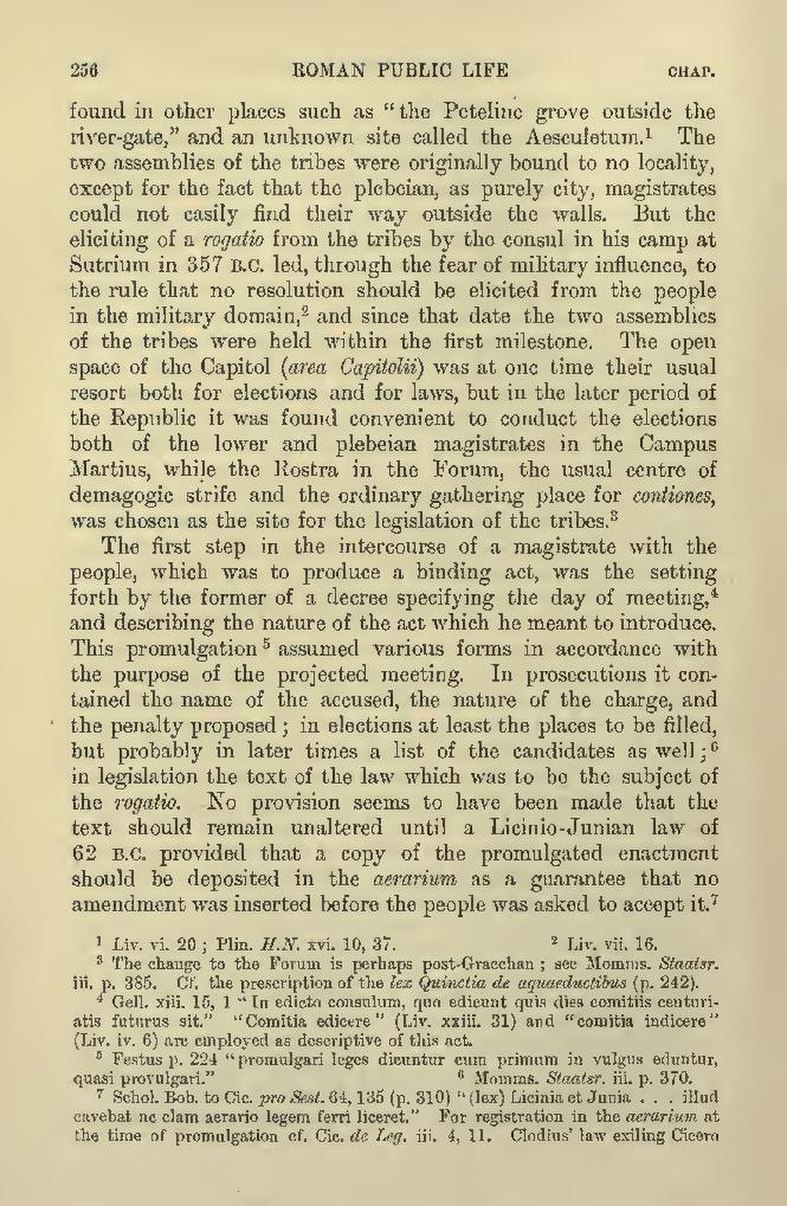found in other places such as "the Peteline grove outside the river-gate," and an unknown site called the Aesculetum.[1] The two assemblies of the tribes were originally bound to no locality, except for the fact that the plebeian, as purely city, magistrates could not easily find their way outside the walls. But the eliciting of a rogatio from the tribes by the consul in his camp at Sutrium in 357 B.C. led, through the fear of military influence, to the rule that no resolution should be elicited from the people in the military domain,[2] and since that date the two assemblies of the tribes were held within the first milestone. The open space of the Capitol (area Capitolii) was at one time their usual resort both for elections and for laws, but in the later period of the Republic it was found convenient to conduct the elections both of the lower and plebeian magistrates in the Campus Martius, while the Rostra in the Forum, the usual centre of demagogic strife and the ordinary gathering place for contiones, was chosen as the site for the legislation of the tribes.[3]
The first step in the intercourse of a magistrate with the people, which was to produce a binding act, was the setting forth by the former of a decree specifying the day of meeting,[4] and describing the nature of the act which he meant to introduce. This promulgation[5] assumed various forms in accordance with the purpose of the projected meeting. In prosecutions it contained the name of the accused, the nature of the charge, and the penalty proposed; in elections at least the places to be filled, but probably in later times a list of the candidates as well;[6] in legislation the text of the law which was to be the subject of the rogatio. No provision seems to have been made that the text should remain unaltered until a Licinio-Junian law of 62 B.C. provided that a copy of the promulgated enactment should be deposited in the aerarium as a guarantee that no amendment was inserted before the people was asked to accept it.[7]*
- ↑ Liv. vi. 20; Plin. H.N. xvi. 10, 37.
- ↑ Liv. vii. 16.
- ↑ The change to the Forum is perhaps post-Gracchan; see Momms. Staatsr. iii. p. 385. Cf. the prescription of the lex Quinctia de aquaeductibus (p. 242).
- ↑ Gell. xiii. 15, 1 "In edicto consulum, quo edicunt quis dies comitiis centuriatis futurus sit." "Comitia edicere" (Liv. xxiii. 31) and "comitia indicere" (Liv. iv. 6) are employed as descriptive of this act.
- ↑ Festus p. 224 "promulgari leges dicuntur cum primum in vulgus eduntur, quasi provulgari."
- ↑ Momms. Staatsr. iii. p. 370.
- ↑ Schol. Bob. to Cic. pro Sest. 64, 135 (p. 310) "(lex) Licinia et Junia . . . illud cavebat ne clam aerario legem ferri liceret." For registration in the aerarium at the time of promulgation cf. Cic. de Leg. iii. 4, 11. Clodius' law exiling Cicero
